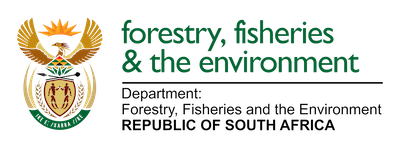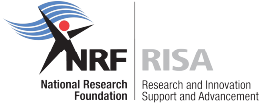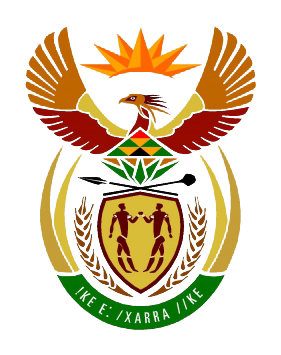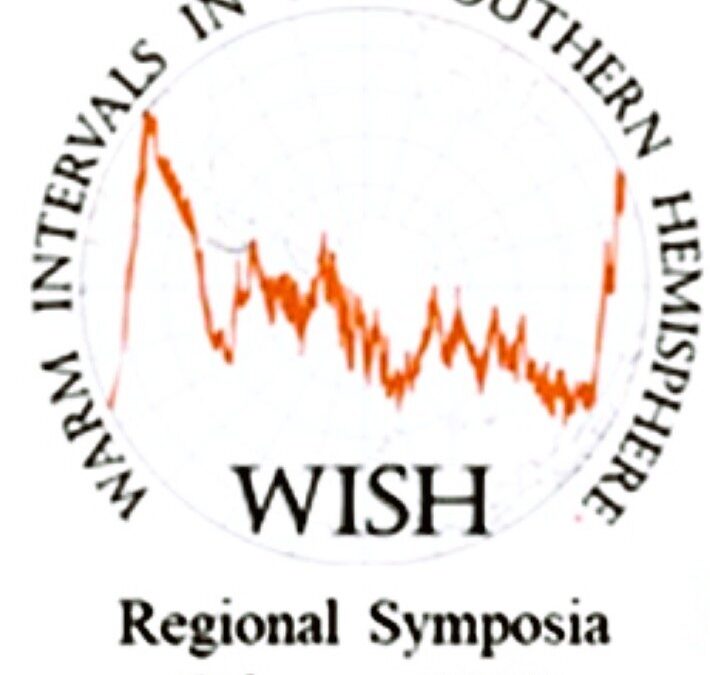
by Ria Olivier | Oct 21, 2024 | Announcement, Antarctica, Research
 You are invited to participate in an online mini symposium on Quaternary (including Holocene!) climate and environmental change in the Southern Hemisphere. This is an initiative by the WiSH (Warm Intervals in the Southern Hemisphere) group, an INQUA funded project. Whether your field is in archaeology, palaeontology, mathematics, palaeoclimate… or you are into developing new methods and techniques in modelling, multi-proxy dating etc., we would like to hear from you!
You are invited to participate in an online mini symposium on Quaternary (including Holocene!) climate and environmental change in the Southern Hemisphere. This is an initiative by the WiSH (Warm Intervals in the Southern Hemisphere) group, an INQUA funded project. Whether your field is in archaeology, palaeontology, mathematics, palaeoclimate… or you are into developing new methods and techniques in modelling, multi-proxy dating etc., we would like to hear from you! 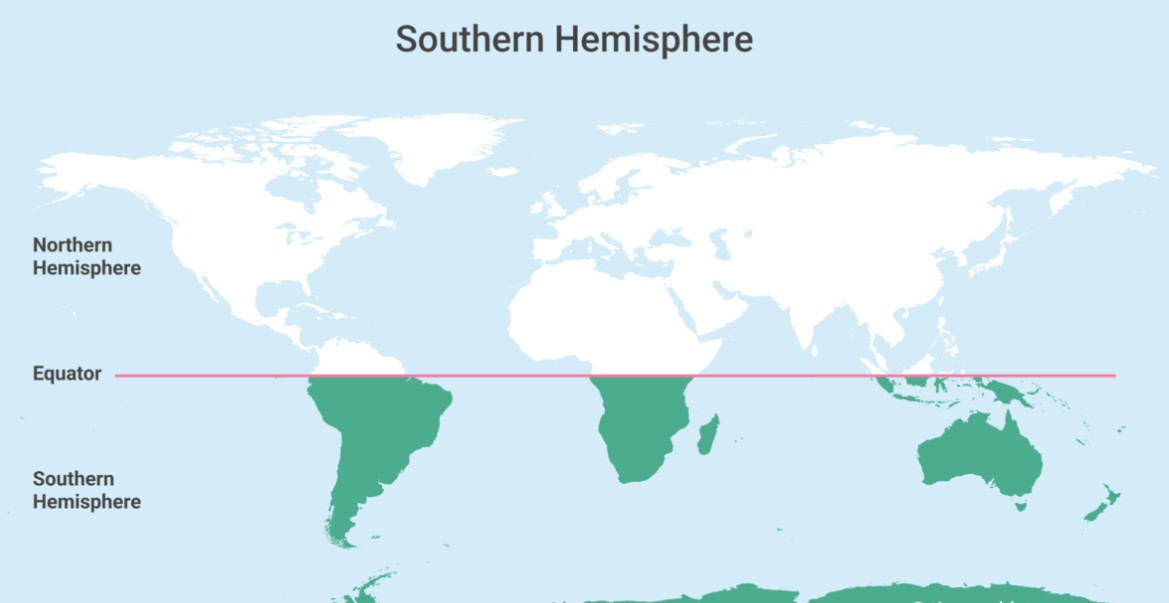 The aim is to share recent research results and ideas related to Southern Hemisphere climatic and environmental change and variability, in particular during the late Pleistocene and Holocene, and in a range of environmental contexts. We especially encourage postgraduate students to attend and present! We have coordinated meetings for each Southern Hemisphere region, as follows, depending on where you work (not where you are based):
The aim is to share recent research results and ideas related to Southern Hemisphere climatic and environmental change and variability, in particular during the late Pleistocene and Holocene, and in a range of environmental contexts. We especially encourage postgraduate students to attend and present! We have coordinated meetings for each Southern Hemisphere region, as follows, depending on where you work (not where you are based):
- South American research community: 4 February 2025 (~9am-3pm Santiago, Chile, UTC-3), online, free of charge!
- Southern African research community: 5 February 2025 (~9am-3pm, Johannesburg, South Africa, UTC+2), online, free of charge!
- New Zealand and Australian research community: 6-8 February 2025, University of Canterbury Cass field station, in person, small charge applies.
In all instances, more information will follow.
To participate by presenting, please submit your abstract by 6 December 2024 using the template (click here to download) to the relevant regional contact below. Submissions can be made to:
If you would like to attend but not participate by presenting, this is absolutely fine, we will be sending meeting links for the S Am/SA online elements, but please indicate your intentions by just dropping an email to the relevant person. Feel free to contact us for any queries.
WiSH Steering Committee contact details:
South America:
Southern Africa:
Australasia:
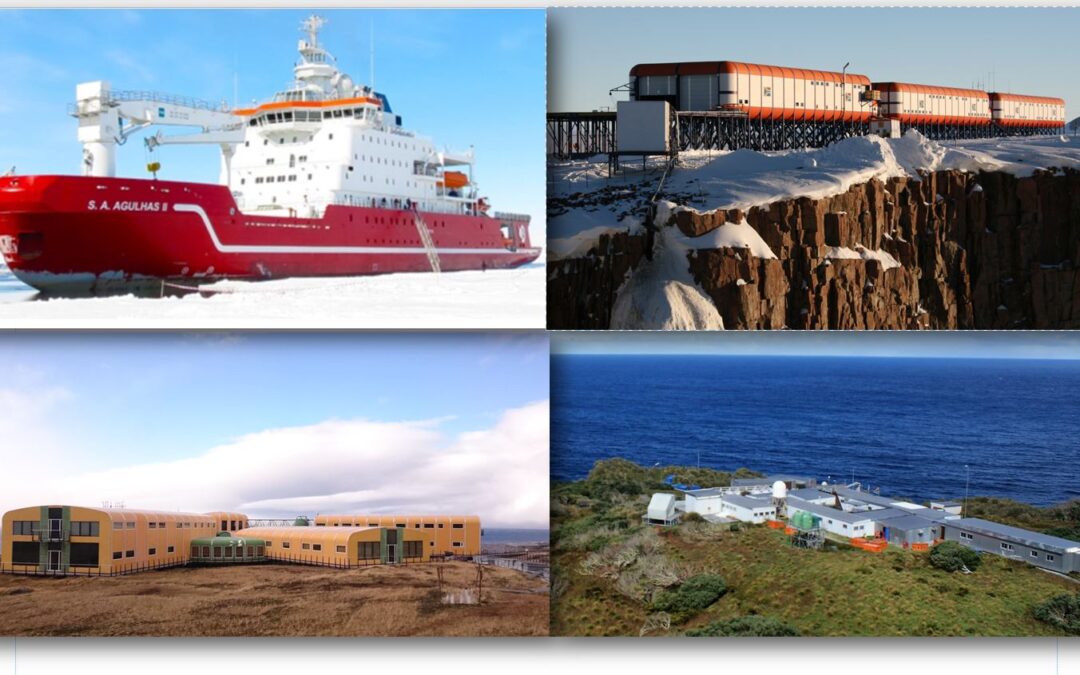
by Ria Olivier | Oct 10, 2024 | Announcement, Antarctica, Arts, Humanities, Research, SANAP, SANAP Student
 South Africa has long had an Antarctic research programme, including a base on the Antarctic continent and a polar vessel. It is the only African country with these facilities and uniquely an early signatory to the Antarctic Treaty System which governs the southern continent. Other countries with Antarctic science programmes—including the US, Australia, and the UK—have Artists and Writers Programmes (AWPs) which include artists, writers and scholars in their scientific programmes. We are piloting a similar programme for South Africa.
South Africa has long had an Antarctic research programme, including a base on the Antarctic continent and a polar vessel. It is the only African country with these facilities and uniquely an early signatory to the Antarctic Treaty System which governs the southern continent. Other countries with Antarctic science programmes—including the US, Australia, and the UK—have Artists and Writers Programmes (AWPs) which include artists, writers and scholars in their scientific programmes. We are piloting a similar programme for South Africa.
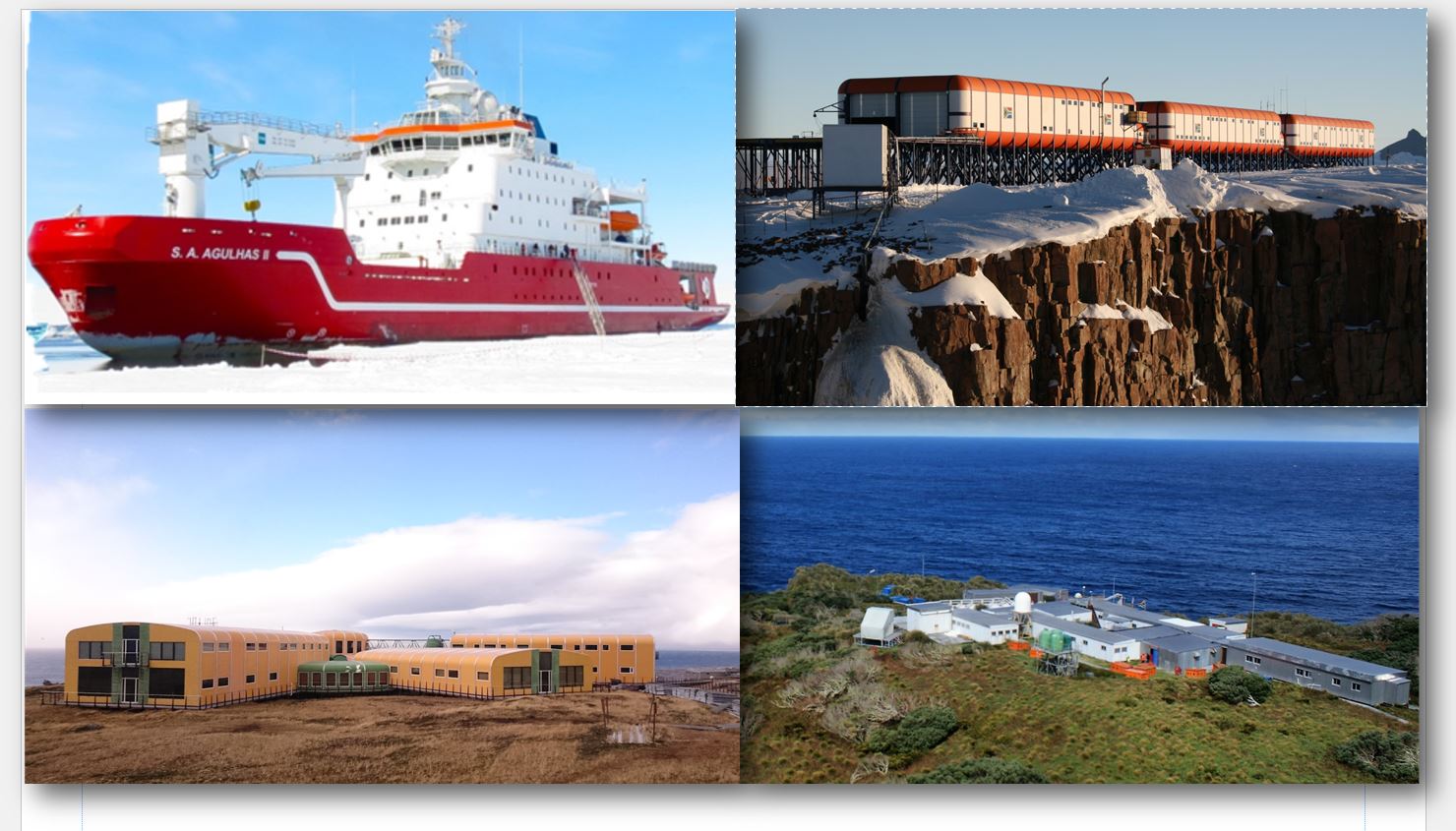 The project works together with scientific research but is focused on approaching the relationship between Africa and Antarctica from a different lens: creative, critical, historical, futurist; focused on questions of aesthetics, ethics, value, storytelling; and with the explicit intention to transform Antarctic participation in relation to race, class and gender.
The project works together with scientific research but is focused on approaching the relationship between Africa and Antarctica from a different lens: creative, critical, historical, futurist; focused on questions of aesthetics, ethics, value, storytelling; and with the explicit intention to transform Antarctic participation in relation to race, class and gender.
This project aims to plan and pilot a South African Antarctic Artists and Writers Programme (AWP), and in so doing to improve public engagement with South African Antarctic involvement through arts production and humanities research. Arts production will be supported by giving artists and writers a formal structure through which access the Antarctic and subantarctic regions, through exhibitions of their work, and through promotion by public events, publication and/or online platforms. Humanities research will provide the context, background, and cultural histories to develop and deepen both arts production and public engagement
Disciplines include: English, Fine Art, Creative Writing, History, Geography, Psychology, Anthropology, Science Communication, Journalism, Media Studies, Music, Dramatic Arts, and related disciplines.
Residency call 2024-2025
Calling artists and writers for a residency on, or about, the sea. The residency offers a 1-3 month immersive experience spending time at sea on a research vessel (the S.A. Agulhas II) or in a polar science lab, with a view to producing an artwork or publication. This residency is part of a pilot project that aims to bring Antarctica, the sub-Antarctic Islands and the Southern Ocean closer to a South African audience through the production of creative works.
FULL DETAILS
CLOSING DATE: 31 October 2024
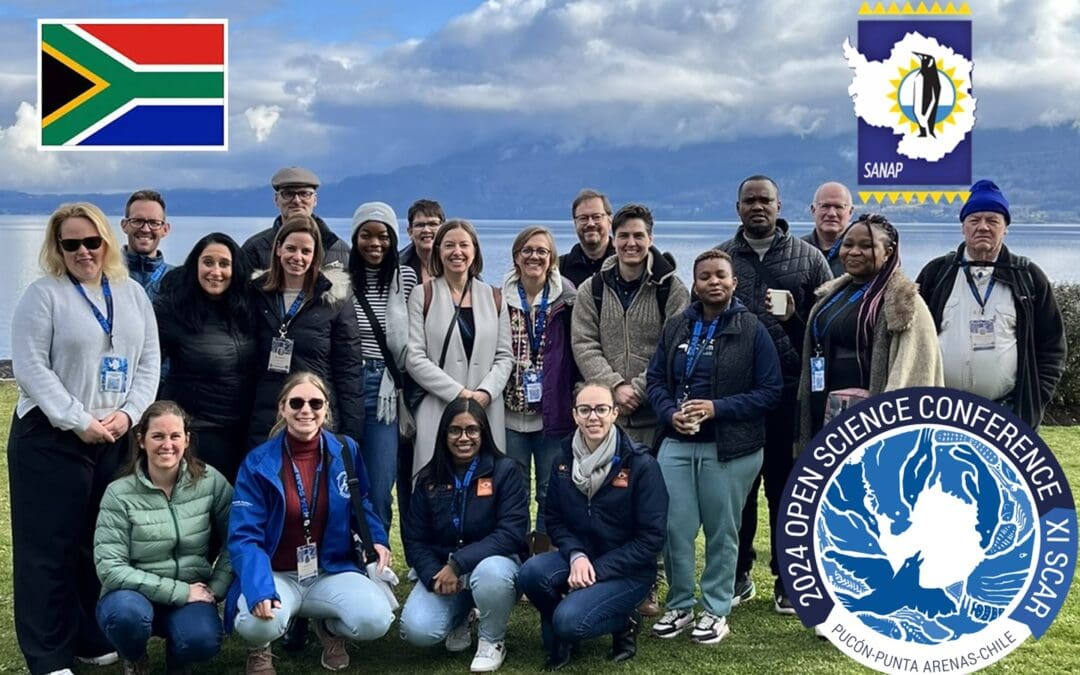
by Ria Olivier | Oct 8, 2024 | Antarctica, Research, SANAP, SANAP Student, SCAR
A dive into the latest research and activities within the Scientific and Antarctic Research community during the biannual conference in Chile.
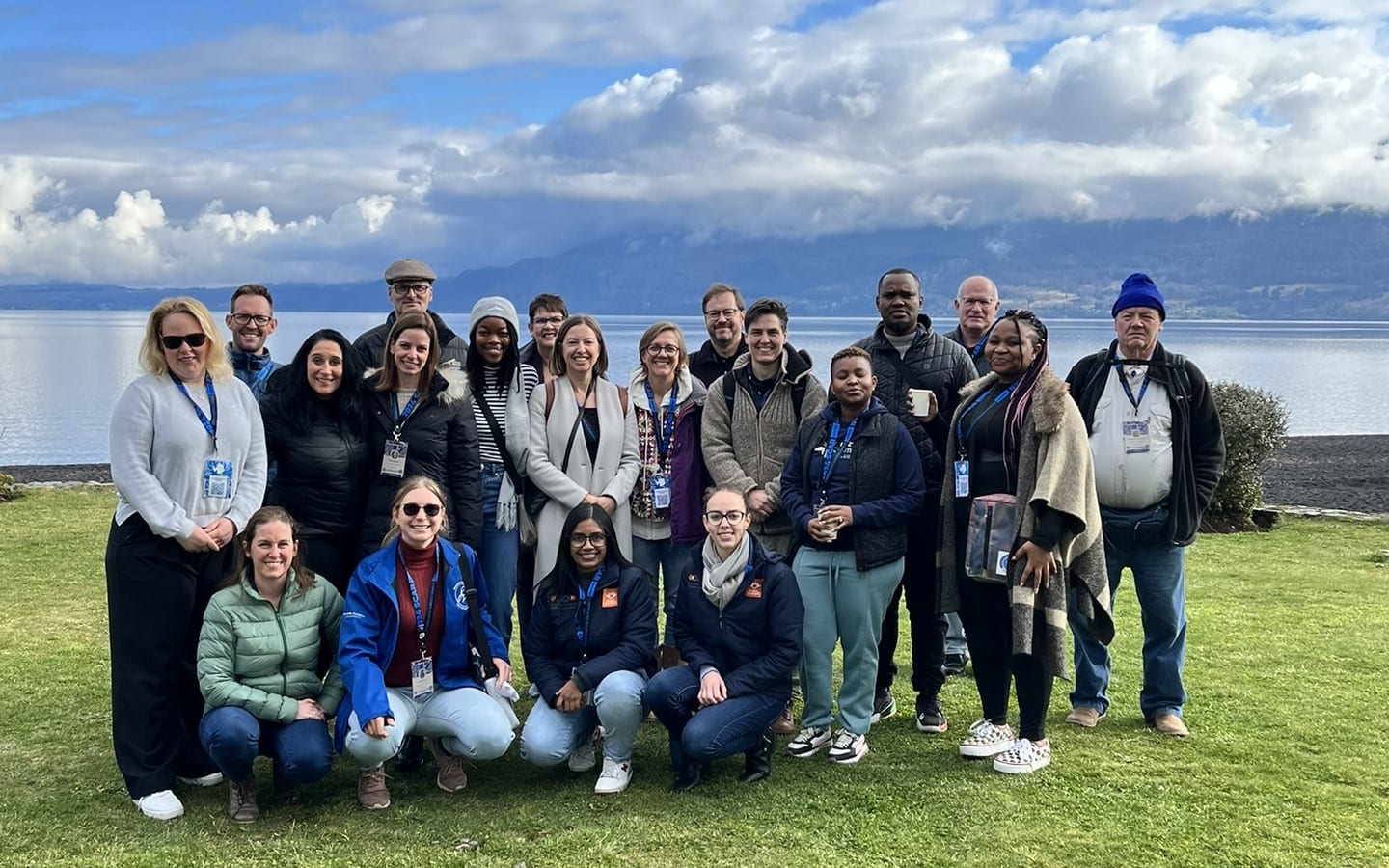
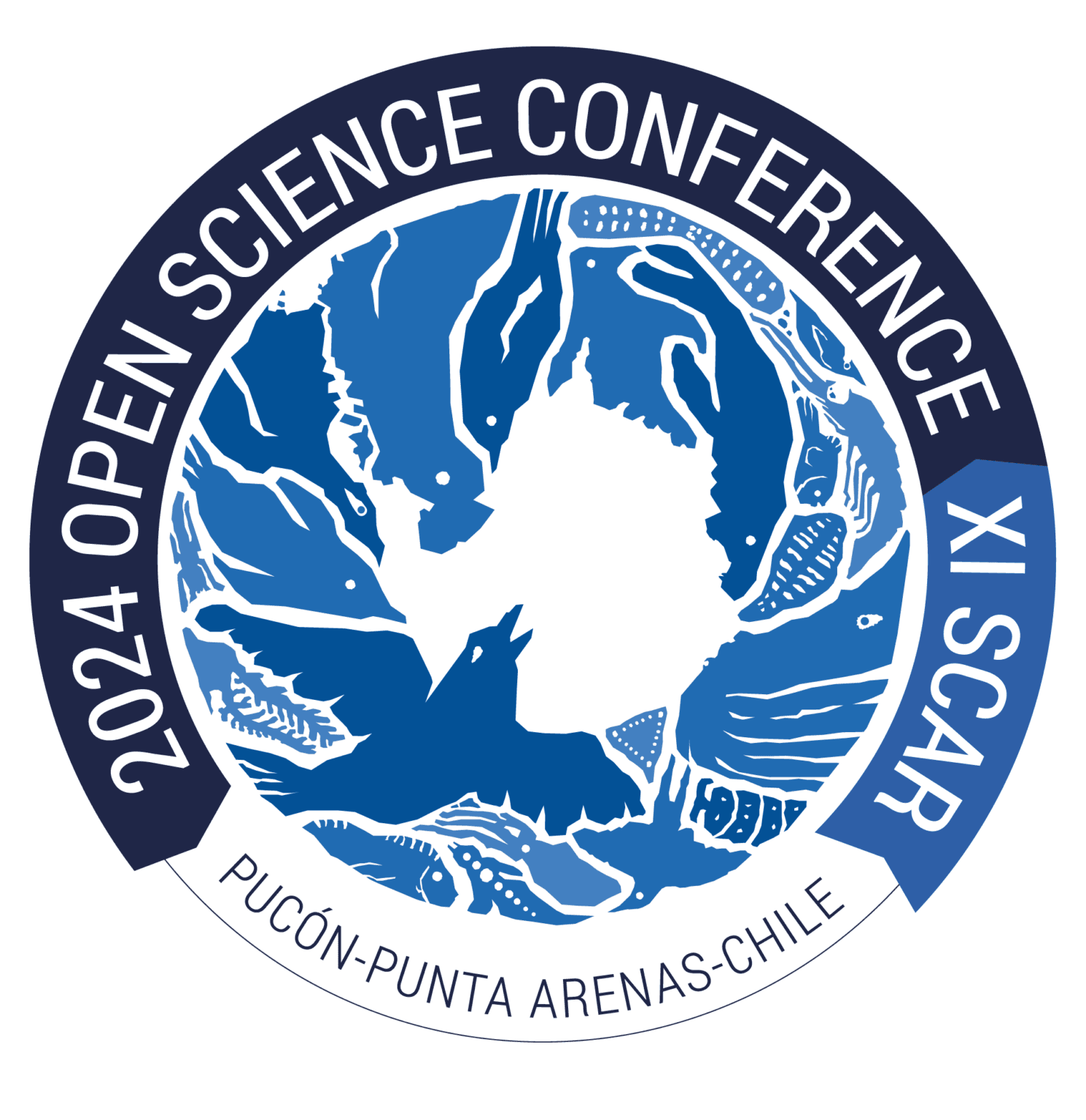 In today’s rapidly evolving scientific landscape, research conferences serve as vital hubs for knowledge exchange, fostering innovation, and building collaborations across disciplines. The recent SCAR conference held in Pucon, Chile during August brought together leading scholars and emerging researchers from around the globe. The event was packed with groundbreaking presentations, hands-on workshops, and insightful discussions that highlighted the latest trends shaping the future of research.
In today’s rapidly evolving scientific landscape, research conferences serve as vital hubs for knowledge exchange, fostering innovation, and building collaborations across disciplines. The recent SCAR conference held in Pucon, Chile during August brought together leading scholars and emerging researchers from around the globe. The event was packed with groundbreaking presentations, hands-on workshops, and insightful discussions that highlighted the latest trends shaping the future of research.
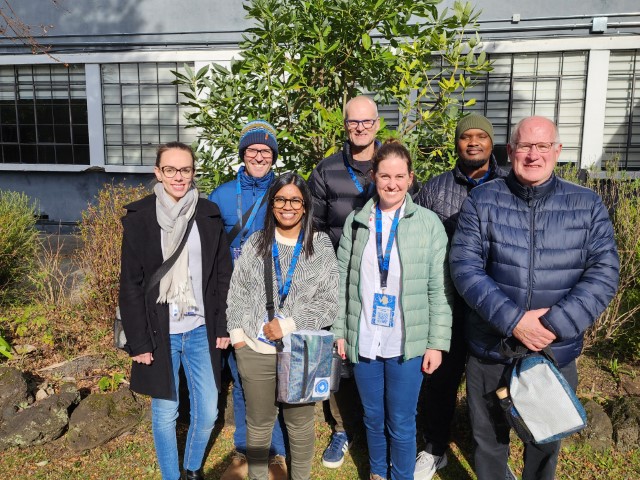 Here’s a closer look at the highlights and takeaways from this year’s conference. (above: Session on sub-Antarctic was an all South African session)
Here’s a closer look at the highlights and takeaways from this year’s conference. (above: Session on sub-Antarctic was an all South African session)
Plenary Lectures and Mini Symposia: The conference had a series of plenary lecture from some of the most respected minds in academia. Dr Victoria Nuviala from Madrid Institute for Advanced Study (MIAS), shared insights into An Architectural Biography of Antarctica. The reckoning: how #MeTooAntarctica is changing fieldwork a presentation by Dr Meredith Nash
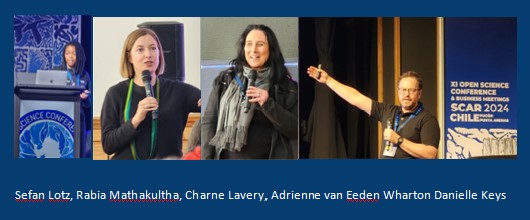 Groundbreaking Research Papers. One of the conference’s core components was the presentation by researchers during the different parallel sessions. Each session provided opportunity for Q&A, enabling in-depth conversations between the audience and the researchers, fostering a true sense of intellectual community. South African researchers presented during these sessions. (above a few presenters captured during their present picture above: Session on sub-Antarctic was an all South African sessions)
Groundbreaking Research Papers. One of the conference’s core components was the presentation by researchers during the different parallel sessions. Each session provided opportunity for Q&A, enabling in-depth conversations between the audience and the researchers, fostering a true sense of intellectual community. South African researchers presented during these sessions. (above a few presenters captured during their present picture above: Session on sub-Antarctic was an all South African sessions)
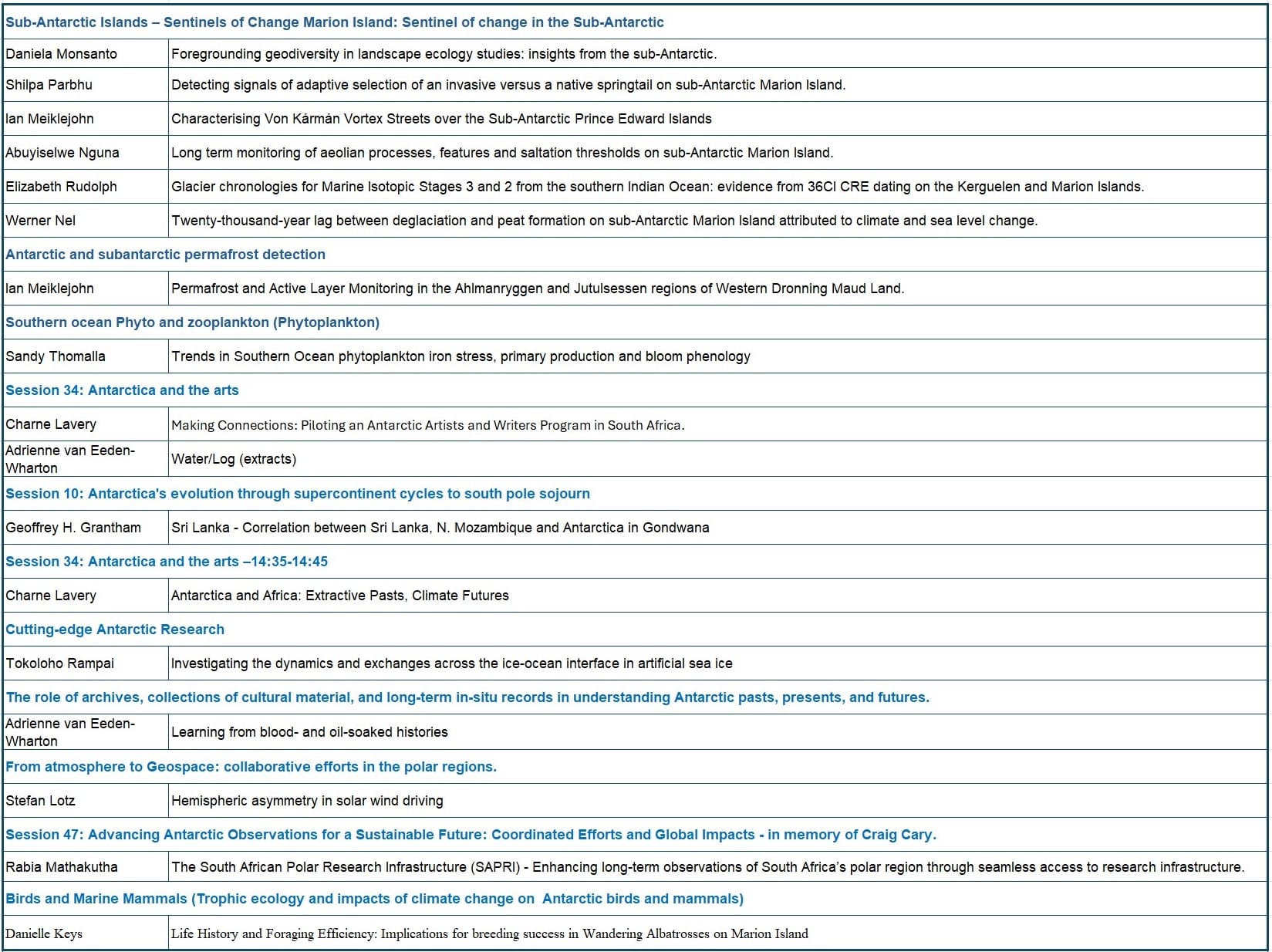 Workshops. Experts from organizations guided participants through various disciplines. Ria Olivier held a workshop on publications in the Antarctica Community and resources on data management
Workshops. Experts from organizations guided participants through various disciplines. Ria Olivier held a workshop on publications in the Antarctica Community and resources on data management
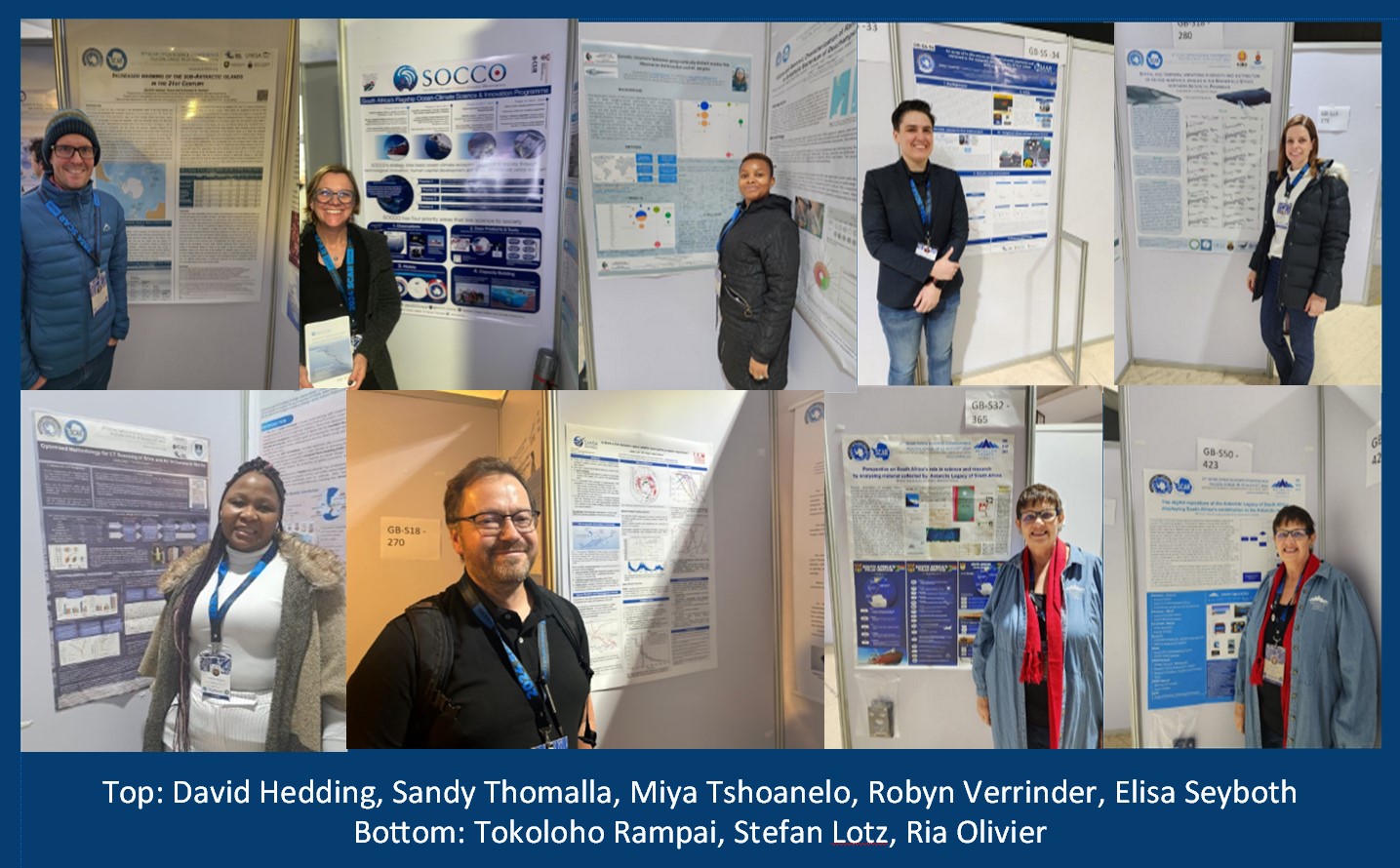 Poster Sessions: Spotlight on Research in addition to formal presentations, these sessions provided a platform for researchers to showcase their work.
Poster Sessions: Spotlight on Research in addition to formal presentations, these sessions provided a platform for researchers to showcase their work.
 Networking and Collaboration. Beyond the formal sessions, the networking opportunities were an integral part of the conference. Through social events, coffee breaks, and an industry exhibition, participants had the chance to connect with peers, potential collaborators, and mentors.
Networking and Collaboration. Beyond the formal sessions, the networking opportunities were an integral part of the conference. Through social events, coffee breaks, and an industry exhibition, participants had the chance to connect with peers, potential collaborators, and mentors.
NEXT SCAR in Norway in 2026! !
Conclusion – SCAR2024 was a celebration of innovation, collaboration, and cutting-edge research. It provided a rich platform for learning, networking, and exchanging ideas that will shape the future of research. For attendees, the event was not only an opportunity to showcase their work but also a reminder of the collaborative spirit that drives scientific progress. As we look forward to next conference, it’s clear that the future holds exciting developments in Antarctic Research, and conferences like this one will continue to play a crucial role in fostering those advancements.
Activities during SCAR2024
Oral & Poster Presentations
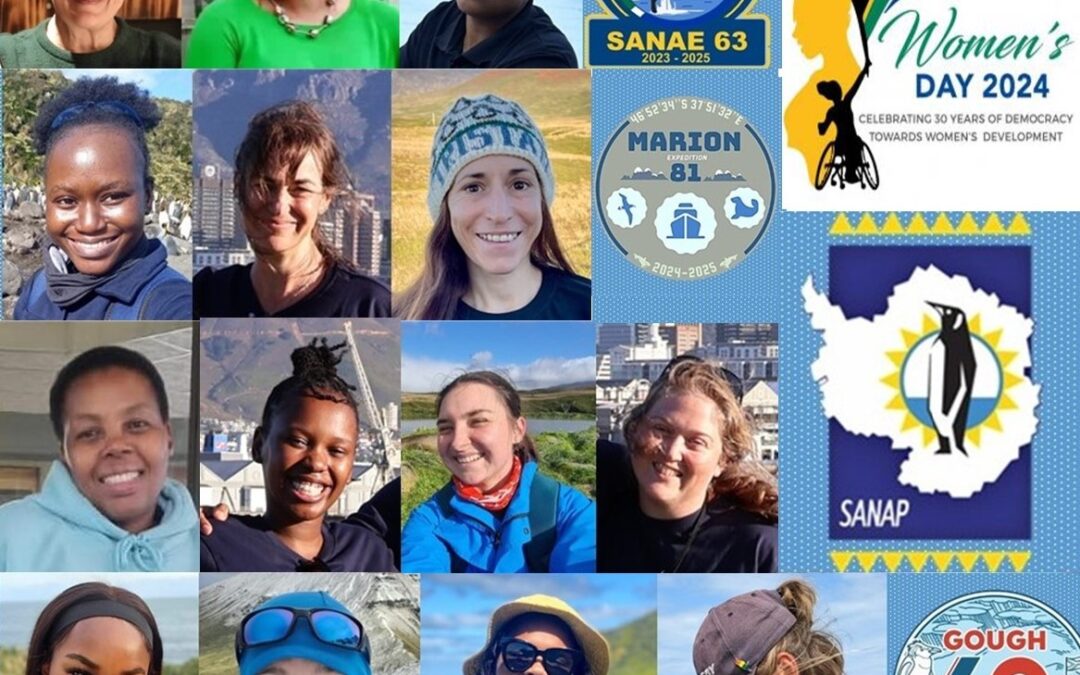
by Ria Olivier | Aug 9, 2024 | Antarctica, APECSSA, Commemorative Days, Gough Island, Legacy, Marion Island, Overwintering Team, Research, SANAE IV, SANAP
Theme of the National Women’s Day Commemoration:
“Celebrating 30 Years of Freedom Towards Women’s Development”
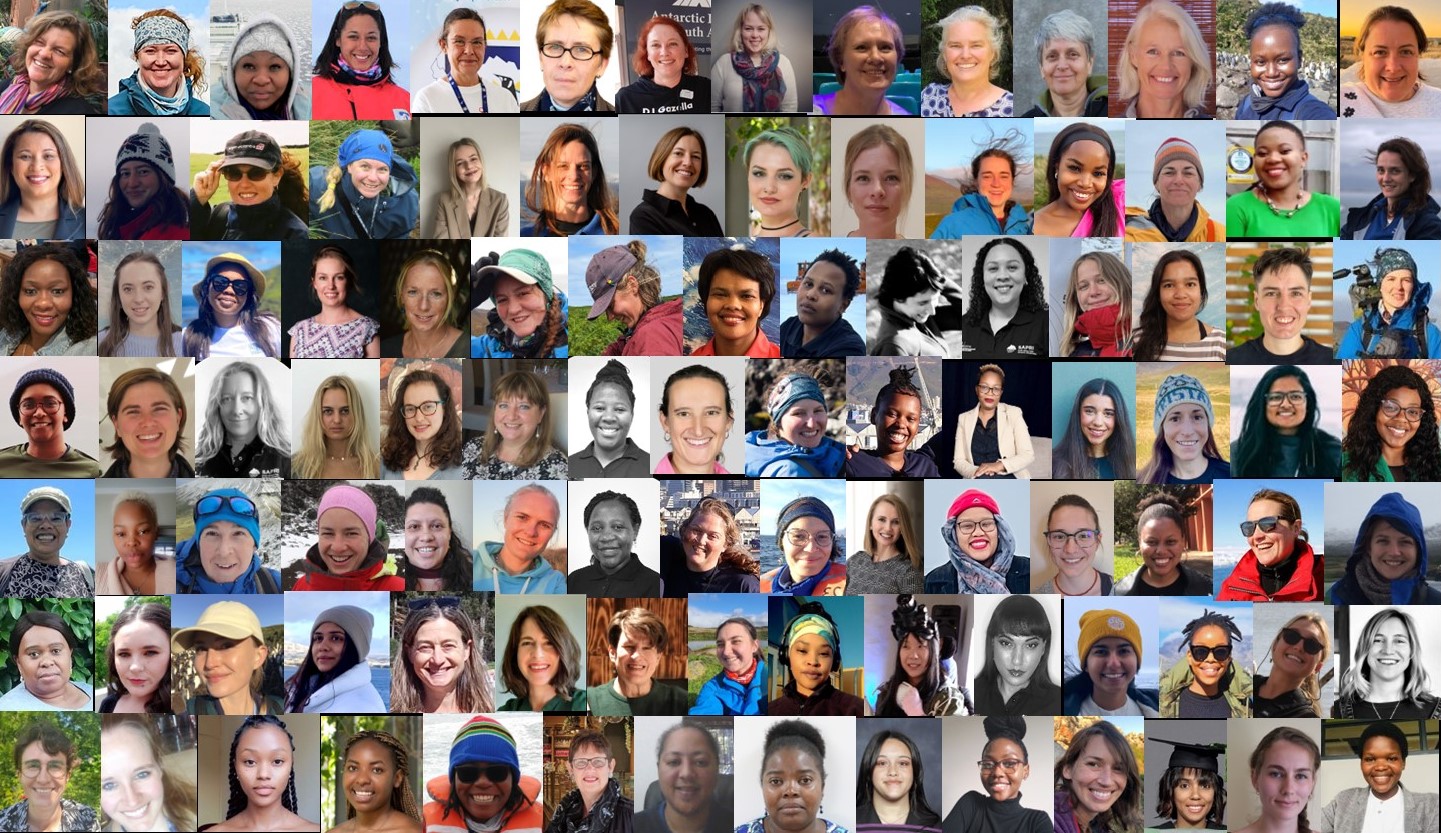 In the SANAP community we are celebrating all those involved as Researchers, Scientists, and Students at tertiary and research institutions and infrastructures, and personnel within the National Research Foundation, the Department of Forestry, Fisheries and the Environment, the Department of Public works and Infrastructure, the South African Weather Services, the South African National Space Agency, the South African Polar Research Infrastructure and all the women serving as part of the crew of the S.A. Agulhas II.
In the SANAP community we are celebrating all those involved as Researchers, Scientists, and Students at tertiary and research institutions and infrastructures, and personnel within the National Research Foundation, the Department of Forestry, Fisheries and the Environment, the Department of Public works and Infrastructure, the South African Weather Services, the South African National Space Agency, the South African Polar Research Infrastructure and all the women serving as part of the crew of the S.A. Agulhas II.
 Celebrating our women overwintering team members at our stations: Antarctica (SANAEIV), Marion Island and Gough Island.
Celebrating our women overwintering team members at our stations: Antarctica (SANAEIV), Marion Island and Gough Island.
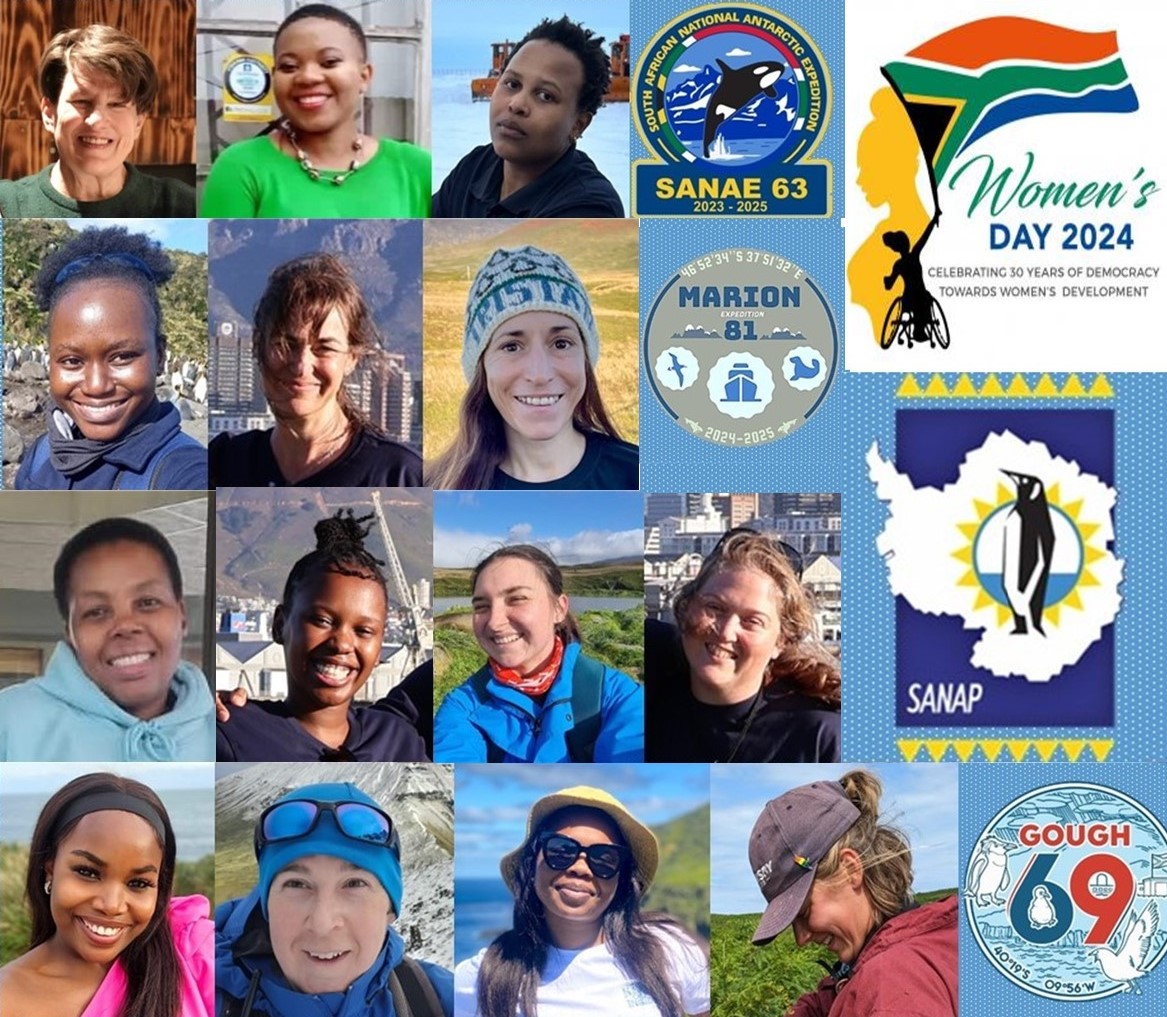 2024 women’s day commemoration is a reminder of the important contributions that are made by women to society, as well as a time to reflect on the advances in women’s rights. During 30 years of democracy, South Africa has made significant strides in advancing gender equality in all domains of society, including economic empowerment of women.
2024 women’s day commemoration is a reminder of the important contributions that are made by women to society, as well as a time to reflect on the advances in women’s rights. During 30 years of democracy, South Africa has made significant strides in advancing gender equality in all domains of society, including economic empowerment of women.
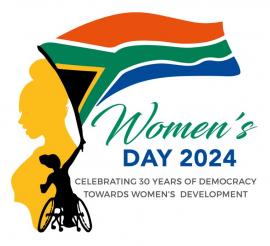 Women’s Day 2024 is the first national day led by the Government of National Unity (GNU) and takes place in a rural community as part of including all South Africans in national events, and placing a focus on the achievements and needs of women in all corners of the country. President Cyril Ramaphosa is expected to officiate the national Women’s Day commemoration in Pofadder in the Namakwa District, Northern Cape. – SAnews.gov.za
Women’s Day 2024 is the first national day led by the Government of National Unity (GNU) and takes place in a rural community as part of including all South Africans in national events, and placing a focus on the achievements and needs of women in all corners of the country. President Cyril Ramaphosa is expected to officiate the national Women’s Day commemoration in Pofadder in the Namakwa District, Northern Cape. – SAnews.gov.za

by Ria Olivier | Jul 5, 2024 | Antarctica, Research, SANAP
 Prof Steven Chown of SAEF visited South Africa during the month of June. The Antarctic Legacy of South Africa at the Department of Botany and Zoology of Stellenbosch University hosted him for a lunch, talk and future discussions.
Prof Steven Chown of SAEF visited South Africa during the month of June. The Antarctic Legacy of South Africa at the Department of Botany and Zoology of Stellenbosch University hosted him for a lunch, talk and future discussions.
The main focus of the talk was that Antarctica is the only continent set aside as a natural reserve devoted to peace and science, with environmental protection mandated through the Protocol on Environmental Protection to the Antarctic Treaty. The extent to which these legal protections succeed depends on high-quality biodiversity knowledge, for status and trends of indigenous species, and for the same information with respect to Invasive Alien Species (IAS), along with understanding of the pressures on the region. Yet such information is remarkably fragmentary, and its route into the policy environment less than straightforward. In consequence, whether that best available data, information, and knowledge are accessible to decision-makers, practitioners, and the public for the region is a work in progress.
“Antarctica’s Future is a choice. We have not yet made that choice, though seem set on a poor one. Choosing a better one will mean choosing a better life for all of us. Making the Antarctic a regular thought in our daily lives is the way to do so. Antarctica’s Future is Everyone’s Future.” – Prof Steven Chown”
SAEF WEBSITE
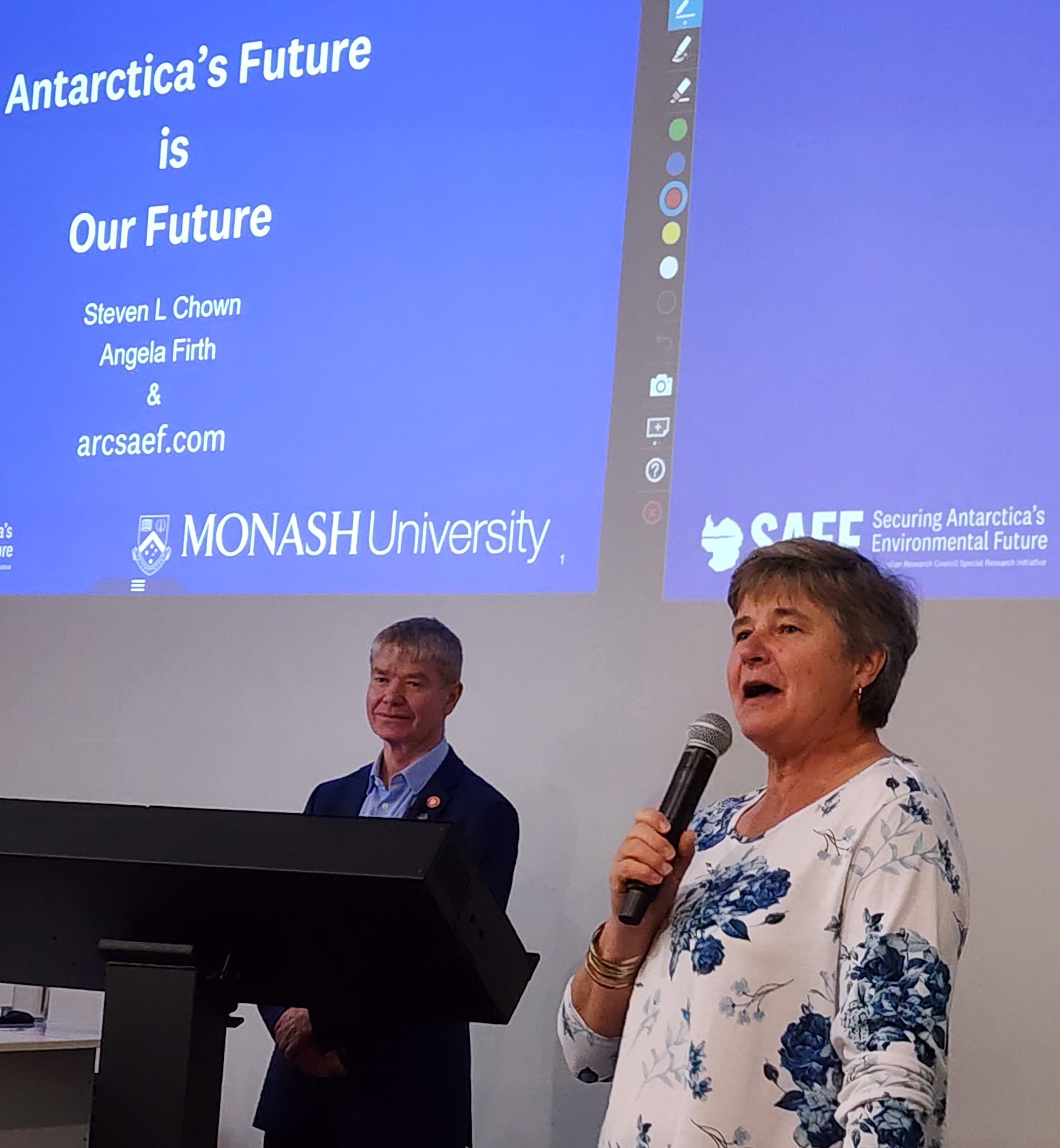 Prof Theresa Wossler, Head of the department, welcomed Prof Chown and introduced him to the attendees. The presentation and talk were attended by eighty-six people in person, who were able to have a chat with Prof Chown afterwards in a coffee break. The talk was streamed online and ninety-six people, representing institutions such as Stellenbosch University, Nelson Mandela University, University of Cape Town, University of Johannesburg, University of South Africa, University of Pretoria, the National Research Foundation, the Department of Forestry, Fisheries, and the Environment and from Belgium from the Department of Natural Sciences were able to attend
Prof Theresa Wossler, Head of the department, welcomed Prof Chown and introduced him to the attendees. The presentation and talk were attended by eighty-six people in person, who were able to have a chat with Prof Chown afterwards in a coffee break. The talk was streamed online and ninety-six people, representing institutions such as Stellenbosch University, Nelson Mandela University, University of Cape Town, University of Johannesburg, University of South Africa, University of Pretoria, the National Research Foundation, the Department of Forestry, Fisheries, and the Environment and from Belgium from the Department of Natural Sciences were able to attend
In the presentation, current progress in resolving the challenges brought by Antarctic change was laid out, including the way in which progress in the Antarctic region may inform and be informed by developments elsewhere. Biodiversity informatics examples that have been applied to questions such as wilderness, non-native species trends, and the likely drivers of biodiversity change are used here to illustrate the power of the approach to inform and improve policy implementation.
Antarctica and its surrounding Southern Ocean are entirely removed from everyday thought. They are remote, isolated, largely unpopulated, and rarely feature in the news. Yet the continent and its surrounding ocean are an intimate part of our daily lives. They regulate the climates we experience and have a large influence on climate extremes.
 The Antarctic Ice Sheet contains 58 m of sea level rise were it to melt entirely. We are already committed to 44-70 cm of global mean sea level rise, meaning that within many lifespans, 1 in 100-year floods will become annual. Sea level rise could be as much as 2 m by 2100. The extra contribution will come from the Antarctic, but we remain uncertain about when we might expect such an addition, and what its exact size will be. Planning for the best has never been a good risk mitigation strategy.
The Antarctic Ice Sheet contains 58 m of sea level rise were it to melt entirely. We are already committed to 44-70 cm of global mean sea level rise, meaning that within many lifespans, 1 in 100-year floods will become annual. Sea level rise could be as much as 2 m by 2100. The extra contribution will come from the Antarctic, but we remain uncertain about when we might expect such an addition, and what its exact size will be. Planning for the best has never been a good risk mitigation strategy.
 Antarctica is also home to some of the world’s most extraordinary biodiversity. While we may be used to its value in western culture, appreciation for its life has a much longer history with first peoples. Biodiversity is now significantly under threat from changing climates, human activities, and their interaction.
Antarctica is also home to some of the world’s most extraordinary biodiversity. While we may be used to its value in western culture, appreciation for its life has a much longer history with first peoples. Biodiversity is now significantly under threat from changing climates, human activities, and their interaction.
Text from Prof Steven Chown abstract. Images : Antarctic Legacy of South Africa
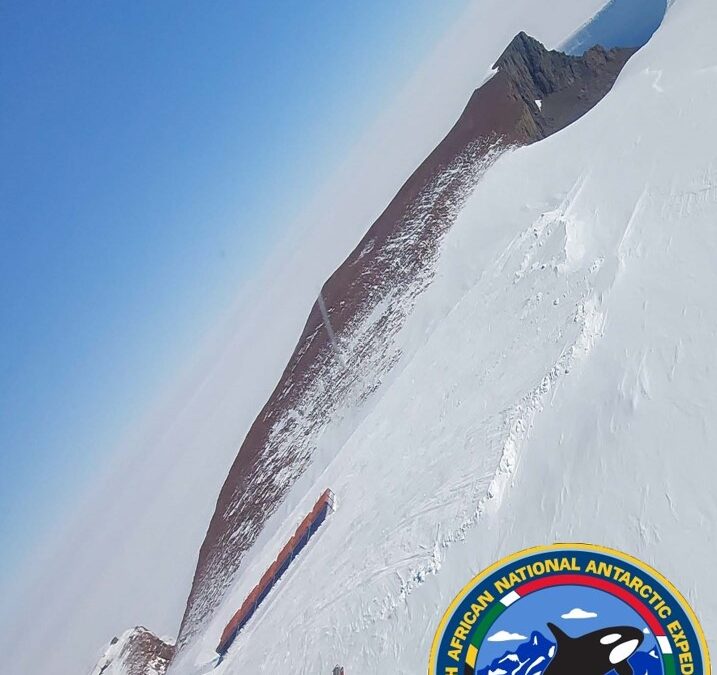
by Ria Olivier | Jun 27, 2024 | Antarctica, Newsletters>SANAE Newsletters, SANAE, SANAP
SANAE 63 Overwintering Team first newsletter now available. Introducing the team members and sharing their memories.
READ NEWSLETTER HERE
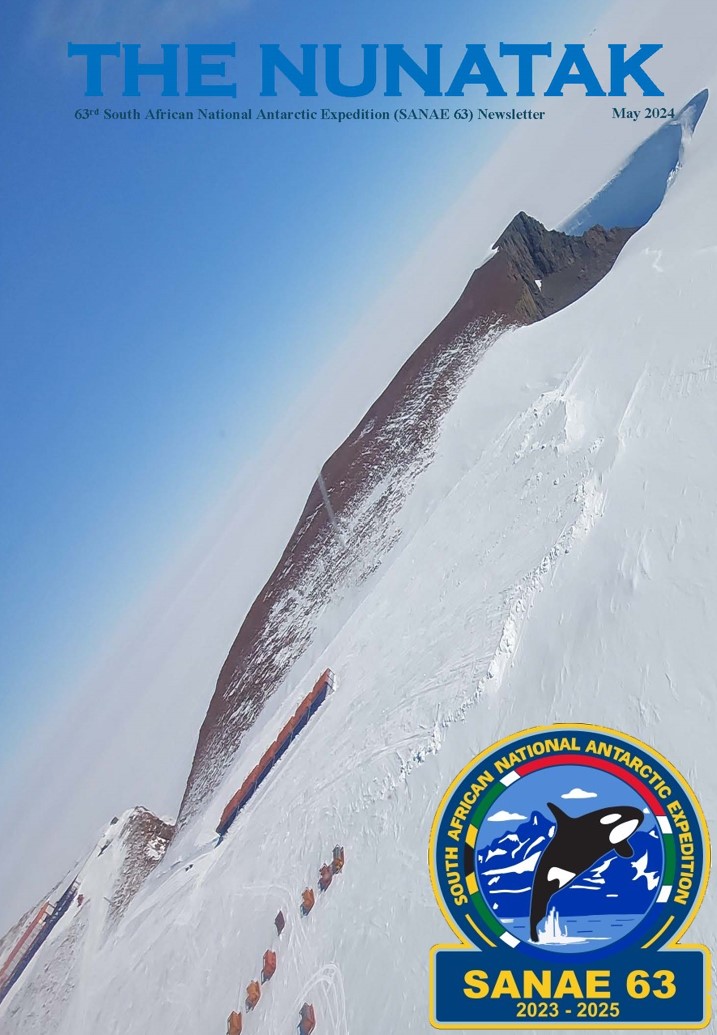 LETTER FROM THE EDITOR
LETTER FROM THE EDITOR
This first edition of the S63 newsletter introduces the team members with highlights of the memorable moments thus far. I hope this edition is fruitful for all our readers. – Tankiso H. Moso, Editor
LETTER FROM THE DEPUTY TEAM LEADER
I remain impressed with everyone’s work ethic. Each person has certainly found his/her stride here at SANAE IV and my overall impression is one of a strong group made up of respectable and mature individuals with a shared identity and purpose whose aim is to hold the legacy of South African National Antarctic Expedition proudly up high. Personally, I am grateful to each and every one of them for making the task of being a Deputy Team Leader a pleasant and gratifying experience for me. I can already see that bonds of friendship are being formed here that will outlive our stay at SANAE IV. – Thulani “Thulz” Ngwaqa, S63 Deputy Team Leader and Base Engineer
MEET THE S63 TEAM – introducing S63 members.
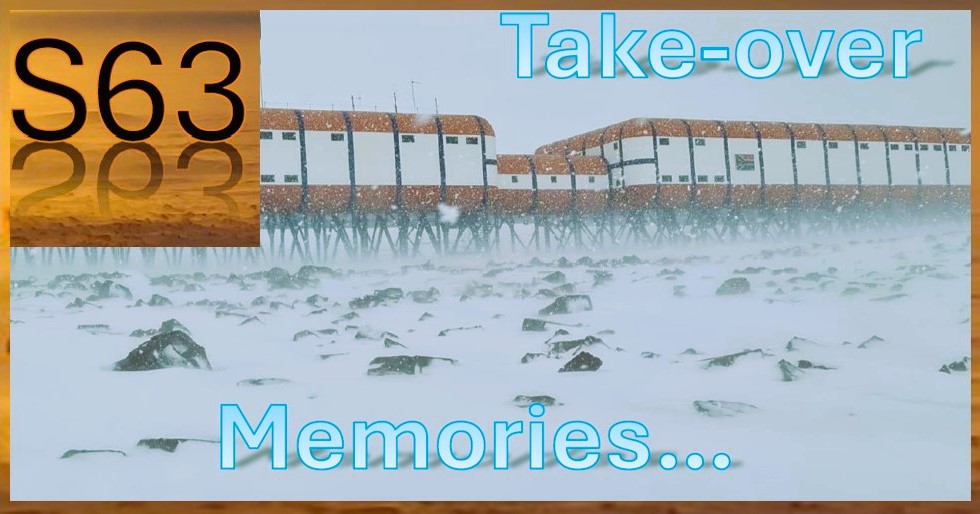 Page through their photo memories
Page through their photo memories

 You are invited to participate in an online mini symposium on Quaternary (including Holocene!) climate and environmental change in the Southern Hemisphere. This is an initiative by the WiSH (Warm Intervals in the Southern Hemisphere) group, an INQUA funded project. Whether your field is in archaeology, palaeontology, mathematics, palaeoclimate… or you are into developing new methods and techniques in modelling, multi-proxy dating etc., we would like to hear from you!
You are invited to participate in an online mini symposium on Quaternary (including Holocene!) climate and environmental change in the Southern Hemisphere. This is an initiative by the WiSH (Warm Intervals in the Southern Hemisphere) group, an INQUA funded project. Whether your field is in archaeology, palaeontology, mathematics, palaeoclimate… or you are into developing new methods and techniques in modelling, multi-proxy dating etc., we would like to hear from you!  The aim is to share recent research results and ideas related to Southern Hemisphere climatic and environmental change and variability, in particular during the late Pleistocene and Holocene, and in a range of environmental contexts. We especially encourage postgraduate students to attend and present! We have coordinated meetings for each Southern Hemisphere region, as follows, depending on where you work (not where you are based):
The aim is to share recent research results and ideas related to Southern Hemisphere climatic and environmental change and variability, in particular during the late Pleistocene and Holocene, and in a range of environmental contexts. We especially encourage postgraduate students to attend and present! We have coordinated meetings for each Southern Hemisphere region, as follows, depending on where you work (not where you are based):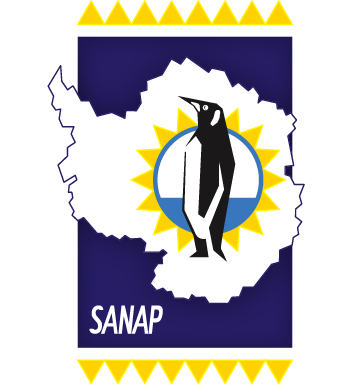

 South Africa has long had an
South Africa has long had an  The project works together with scientific research but is focused on approaching the relationship between Africa and Antarctica from a different lens: creative, critical, historical, futurist; focused on questions of aesthetics, ethics, value, storytelling; and with the explicit intention to transform Antarctic participation in relation to race, class and gender.
The project works together with scientific research but is focused on approaching the relationship between Africa and Antarctica from a different lens: creative, critical, historical, futurist; focused on questions of aesthetics, ethics, value, storytelling; and with the explicit intention to transform Antarctic participation in relation to race, class and gender.

 In today’s rapidly evolving scientific landscape, research conferences serve as vital hubs for knowledge exchange, fostering innovation, and building collaborations across disciplines. The recent SCAR conference held in Pucon, Chile during August brought together leading scholars and emerging researchers from around the globe. The event was packed with groundbreaking presentations, hands-on workshops, and insightful discussions that highlighted the latest trends shaping the future of research.
In today’s rapidly evolving scientific landscape, research conferences serve as vital hubs for knowledge exchange, fostering innovation, and building collaborations across disciplines. The recent SCAR conference held in Pucon, Chile during August brought together leading scholars and emerging researchers from around the globe. The event was packed with groundbreaking presentations, hands-on workshops, and insightful discussions that highlighted the latest trends shaping the future of research. Here’s a closer look at the highlights and takeaways from this year’s conference. (above: Session on sub-Antarctic was an all South African session)
Here’s a closer look at the highlights and takeaways from this year’s conference. (above: Session on sub-Antarctic was an all South African session)


 Networking and Collaboration. Beyond the formal sessions, the networking opportunities were an integral part of the conference. Through social events, coffee breaks, and an industry exhibition, participants had the chance to connect with peers, potential collaborators, and mentors.
Networking and Collaboration. Beyond the formal sessions, the networking opportunities were an integral part of the conference. Through social events, coffee breaks, and an industry exhibition, participants had the chance to connect with peers, potential collaborators, and mentors.
 In the SANAP community we are celebrating all those involved as Researchers, Scientists, and Students at tertiary and research institutions and infrastructures, and personnel within the National Research Foundation, the Department of Forestry, Fisheries and the Environment, the Department of Public works and Infrastructure, the South African Weather Services, the South African National Space Agency, the South African Polar Research Infrastructure and all the women serving as part of the crew of the S.A. Agulhas II.
In the SANAP community we are celebrating all those involved as Researchers, Scientists, and Students at tertiary and research institutions and infrastructures, and personnel within the National Research Foundation, the Department of Forestry, Fisheries and the Environment, the Department of Public works and Infrastructure, the South African Weather Services, the South African National Space Agency, the South African Polar Research Infrastructure and all the women serving as part of the crew of the S.A. Agulhas II. Celebrating our women overwintering team members at our stations: Antarctica (SANAEIV), Marion Island and Gough Island.
Celebrating our women overwintering team members at our stations: Antarctica (SANAEIV), Marion Island and Gough Island. 2024 women’s day commemoration is a reminder of the important contributions that are made by women to society, as well as a time to reflect on the advances in women’s rights. During 30 years of democracy, South Africa has made significant strides in advancing gender equality in all domains of society, including economic empowerment of women.
2024 women’s day commemoration is a reminder of the important contributions that are made by women to society, as well as a time to reflect on the advances in women’s rights. During 30 years of democracy, South Africa has made significant strides in advancing gender equality in all domains of society, including economic empowerment of women. Women’s Day 2024 is the first national day led by the Government of National Unity (GNU) and takes place in a rural community as part of including all South Africans in national events, and placing a focus on the achievements and needs of women in all corners of the country. President Cyril Ramaphosa is expected to officiate the
Women’s Day 2024 is the first national day led by the Government of National Unity (GNU) and takes place in a rural community as part of including all South Africans in national events, and placing a focus on the achievements and needs of women in all corners of the country. President Cyril Ramaphosa is expected to officiate the 
 Prof Steven Chown of
Prof Steven Chown of  Prof Theresa Wossler, Head of the department, welcomed Prof Chown and introduced him to the attendees. The presentation and talk were attended by eighty-six people in person, who were able to have a chat with Prof Chown afterwards in a coffee break. The talk was streamed online and ninety-six people, representing institutions such as Stellenbosch University, Nelson Mandela University, University of Cape Town, University of Johannesburg, University of South Africa, University of Pretoria, the National Research Foundation, the Department of Forestry, Fisheries, and the Environment and from Belgium from the Department of Natural Sciences were able to attend
Prof Theresa Wossler, Head of the department, welcomed Prof Chown and introduced him to the attendees. The presentation and talk were attended by eighty-six people in person, who were able to have a chat with Prof Chown afterwards in a coffee break. The talk was streamed online and ninety-six people, representing institutions such as Stellenbosch University, Nelson Mandela University, University of Cape Town, University of Johannesburg, University of South Africa, University of Pretoria, the National Research Foundation, the Department of Forestry, Fisheries, and the Environment and from Belgium from the Department of Natural Sciences were able to attend Antarctica is also home to some of the world’s most extraordinary biodiversity. While we may be used to its value in western culture, appreciation for its life has a much longer history with first peoples. Biodiversity is now significantly under threat from changing climates, human activities, and their interaction.
Antarctica is also home to some of the world’s most extraordinary biodiversity. While we may be used to its value in western culture, appreciation for its life has a much longer history with first peoples. Biodiversity is now significantly under threat from changing climates, human activities, and their interaction.
 LETTER FROM THE EDITOR
LETTER FROM THE EDITOR Page through their photo memories
Page through their photo memories
